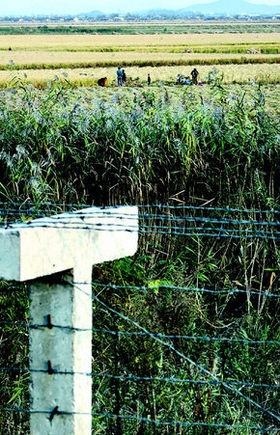 |
|
North Korean farmers harvest rice on October 22, near a border fence newly set up by China.
|
Words to Chinese diplomat a message to the U.S., as well
When North Korean leader Kim Jong-il and Chinese special envoy Tang Jiaxuan met in Pyongyang on October 19, just about a week after the North’s October 9 nuclear test, the North had two core messages to deliver. One was that the "denuclearization of the Korean peninsula was the dying wish of Kim Il-sung," the founder of the Stalinist nation who died in 1994. The other is that easing of U.S. policy against North Korea is a solution to the nuclear problem. The North Korean attitude regarding a second nuclear test is clear. The communist nation claims that holding another test is a right held by nuclear powers, so Pyongyang is not likely to abandon the potential for such a test now. However, North Korea has to deal with China’s difficult position, as well, caught between trying to be the buffer between U.S. and Japanese calls for ultra-tough sanctions against the North, and saving face after the North ignored China’s warnings and went ahead with the test. Pyongyang thus could not send special envoy Tang back to China empty-handed. In an interview with ABC on October 21 in Pyongyang, North Korea’s Vice Foreign Minister Kim gye-gwan said, "We haven’t said that we will conduct another nuclear test." With this remark, North Korea avoided using the words "preparation" regarding a second nuclear test: the reclusive nation kept its right to an additional test, while at the same time ceding some ground to China’s demands. Tang’s remark that "my visit has not been in vain" has the same meaning. North Korea merely said it has stopped the preparation for the second test, and it can restart it again at any time. This is another card that North Korea knows it can play, and it is an effective one. This is why the United States takes North Korea’s words with a grain of salt. What does it mean to say that the denuclearization of the Korean Peninsula was the dying wish of Kim Il-sung? This comment is aimed at the U.S. and China, in an attempt to convey the message that North Korean leader Kim Jong-il also cannot disobey his father’s dying wish. North Korea resumed the six-party talks with these words last year. Prof. Kim Yeon-chul of Korea University said that the words were also mentioned during the June 17 meeting between Kim Jong-il and South Korean politician Chung Dong-young last year. "It is reconfirmation of existing policies, but I interpret it as North Korea saying there is no reason to become a nuclear power." Prof. Kim is saying that Kim’s words mean that if the international community guarantees the survival of Kim Jong-il’s regime, he will abandon nuclear weapons.Then why did Kim Jong-il conduct a nuclear test? The reason is contained in the North’s second message in its meeting with the Chinese envoy. North Korea sees the nuclear weapons card as a means to dissolve Washington’s hostile policies against it, and to secure its regime. According to the North in its October 3 announcement of its plans to conduct a nuclear test, "Our final goal is not a denuclearization leading to our unilateral disarmament, but a denuclearization which puts an end to North Korea-U.S. hostile relations and ultimately removes all the nuclear-related threats from the Korean Peninsula and the neighboring countries. There is no change to our fundamental position to realize denuclearization of the Korean Peninsula through dialogue and negotiation." This attitude by North Korea, in principle, does not contradict the view of China and South Korea - that a nuclear-armed North Korea should not be tolerated. U.S. Secretary of State Condoleezza Rice, while visiting Beijing on October 20, urged North Korea to unconditionally return to the six-party talks. Pyongyang’s response will be measured by whether Washington has a will to drop its hostile policy against Pyongyang.






